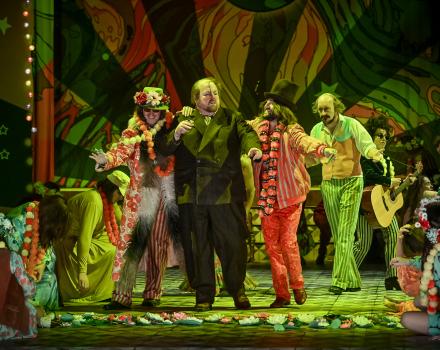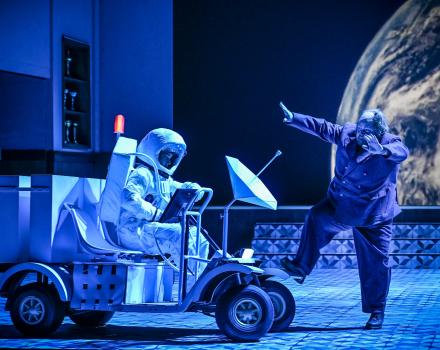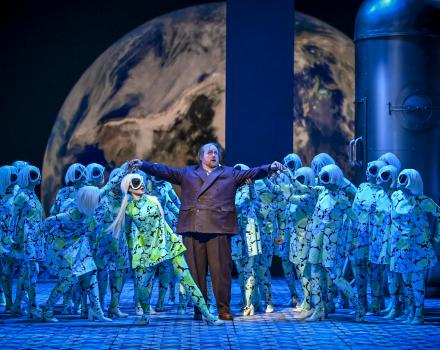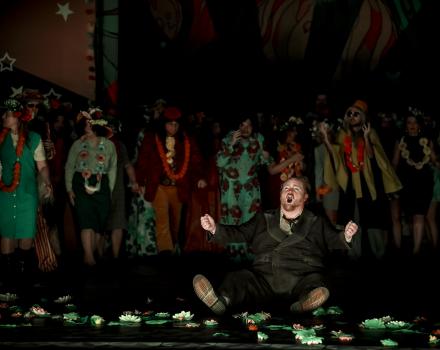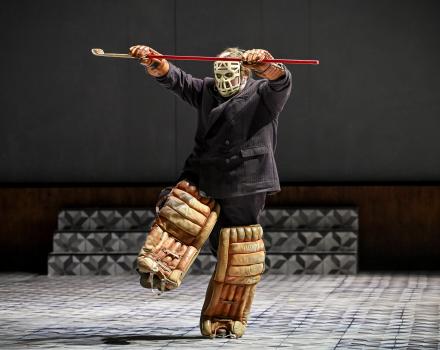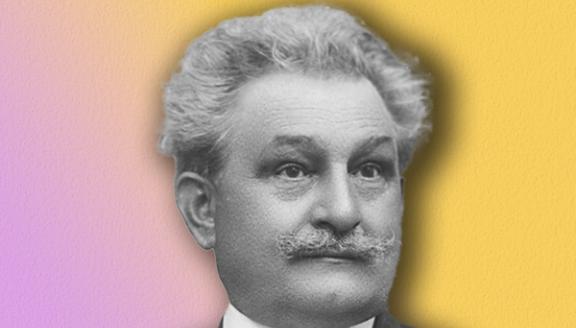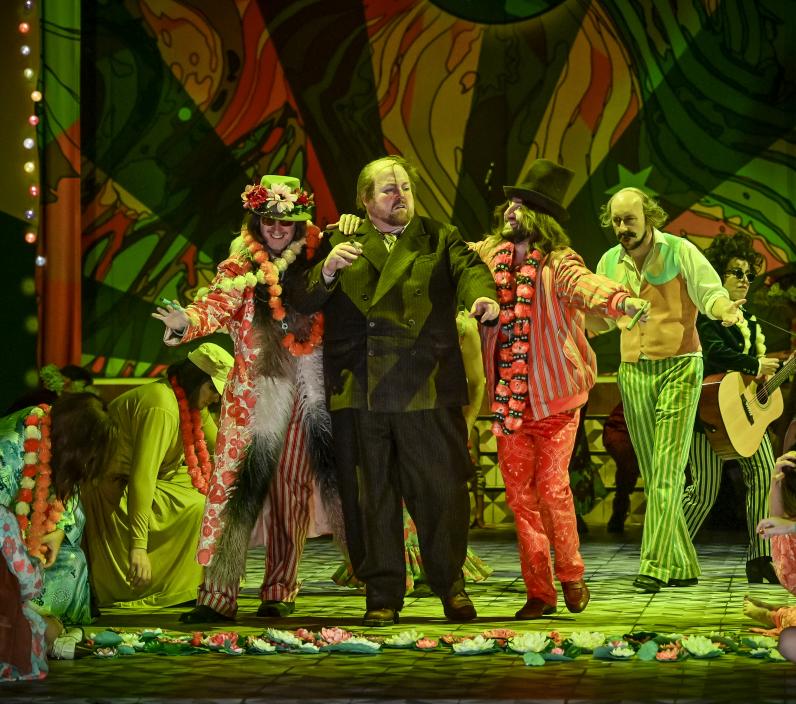
We are off on an excursion, two excursions in fact, in the company of a landlord from Prague, who is, let us say, a little rough around the edges. The first journey of Mr Brouček is to the Moon where our beer-drinking hero (literally ‘Mr Beetle’) meets the oh-so sophisticated Moon-dwellers. In the second, we travel through time to the early 15th century to a heroic period in Czech history when the Czechs fought off armies of crusaders from the rest of Europe. Will Mr Brouček fare any better in Prague circa 1420, when Czechs are on the eve of a famous victory defending their Hussite faith?
The Excursions of Mr. Brouček is Janáček’s most overtly comic opera, the comedy essentially deriving from the confrontation of Mr Brouček with worlds beyond his limited imagination. The effect, however, is rather different in the two halves. In the first excursion Mr Brouček, in comparison with the rarefied moon-artists, offers the voice of sturdy common sense. In the second, Mr Brouček’s 'reasonableness' makes a poor showing against the sacrifices of the patriotic Hussites. Janáček’s motive for setting this second excursion was a moral appeal to the citizens of the future Czechoslovak Republic. The opera was not easy to create, Janáček went through several librettists; it took him nine years to reach a successful conclusion. But the result is a delightfully experimental piece notably with music of great charm in the first half and rousing Hussite chorales in the second. For this new production from the heart of the composer’s home country, Janáček Festival Brno has entrusted the staging to the famous Canadian director, Robert Carsen who thus opens the 2024 Festival with this, his sixth production of a Janáček opera.
CAST
|
Matěj Brouček
|
Nicky Spence
|
|---|---|
|
Mazal / Blankytný / Petřík
|
Daniel Matoušek
|
|
Sacristan / Lunobor / Domšík
|
David Szendiuch
|
|
Málinka / Etherea / Kunka
|
Doubravka Novotná
|
|
Würfl / Čaroskvoucí / Councillor
|
Jan Šťáva
|
|
Číšníček / Child prodigy / Student
|
Andrea Široká
|
|
Kedruta
|
Jana Horáková Levicová
|
|
Svatopluk Čech
|
Daniel Kfelíř
|
|
Básník / Other voice / Oblačný / Vacek Bradatý
|
Tadeáš Hoza
|
|
Malíř / Professor’s voice / Duhoslav / Vojta
|
Vít Nosek
|
|
Skladatel / Harfoboj / Miroslav Zlatník
|
Ondřej Koplík
|
|
I. Taborite
|
Petr Karas
|
|
Poet
|
Martin Pavlíček
|
|
Other Poet / II. Taborite
|
Pavel Valenta
|
|
Orchestra
|
Janáček Opera NdB Orchestra
|
|
Chorus
|
Janáček Opera NdB Chorus
|
| ... | |
|
Music
|
Leoš Janáček
|
|---|---|
|
Text
|
František Gellner
Viktor Dyk
František Sarafínský Procházka
F. S. Procházka
|
|
Director
|
Robert Carsen
|
|
Conductor
|
Marko Ivanović
|
|
Sets
|
Radu Boruzescu
|
|
Costumes
|
Annemarie Woods
|
|
Lights
|
Robert Carsen
Peter van Praet
|
|
Choreography
|
Rebecca Howell
|
|
Dramaturgy
|
Robert Carsen
Patricie Částková
|
|
Chorus Masters
|
Martin Buchta
Pavel Koňárek
|
|
Video
|
Dominik Žižka
|
| ... | |
VIDEOS
STORY
Act I
It is a busy evening at the Vikárka pub in Prague. Mr. Brouček, a local landlord, is more interested in his beer and sausages than in anything else. Málinka, the Sacristan’s daughter, is angry with her boyfriend Mazal, one of Mr. Brouček’s many tenants, because he has been seen dancing with another girl. To make him jealous, Málinka decides to flirt with Mazal’s landlord. Brouček is so drunk that he promises to marry her, but when her father asks him about the marriage, Brouček quickly insists that he was joking and would marry Málinka only if they were both on the Moon.
It is late and the innkeeper Würfl closes the pub. Only the drunken Brouček is left behind. Before falling asleep, he tells the Moon that he would rather live up there and avoid all the people who never pay their rent and try to steal his money. Dreaming he is on the Moon, Brouček recognises some of the Moon dwellers: one of them, called Blankytný, seems very similar to Mazal, while another one, called Etherea, clearly reminds Brouček of Málinka. This same Etherea, led on by her father Lunobor and attended by many Moon maidens, instantly falls in love with Brouček. Helped by the Moon maidens, Etherea manages to abduct the reluctant landlord.
When Etherea re-appears with Brouček, Čaroskvoucí, another inhabitant of the Moon, introduces the strange earthling to all the artists on the Moon, but the hungry and thirsty Brouček is not remotely interested in poetry, music, or art of any kind. The Moon artists live entirely by sniffing flowers, and the famished Brouček disgusts them when he suddenly pulls a sausage out of his pocket. As they leave in horror, Brouček hopes finally to be left alone to eat in peace, but he is prevented by the ever more passionate Etherea…
Brouček’s imaginary visit to the Moon ends back on Earth in the safety of the Vikárka pub where he sleeps peacefully, while Mazal and Málinka make up after their argument…
Act II
Brouček, in no way discouraged by his adventures on the Moon, has got drunk once again in the Vikárka pub, where he sets off on an even more surprising and dangerous adventure: he now imagines himself in the medieval streets of Prague, caught up with the Czech people as they fight enemy invaders. These patriots, even those whom Brouček recognises, welcome him as a kindred spirit, but Brouček intends to avoid fighting at all costs: he may love his country, its beer and sausages, but he is not willing to give up his life for them.
When the people of Prague celebrate victory over the enemy, Brouček brags about how bravely he fought, but he is accused of lying to cover up his cowardly behaviour. He is sentenced to be burned alive in a beer barrel when he suddenly wakes up, in the safety of one of the empty beer tanks of the Vikárka pub. Thrilled to have returned intact from his latest incredible journey, Brouček brags to the innkeeper about his heroic deeds, but implores him to be discreet and not tell anyone about them…
INSIGHTS
To the moon and back – with twists and turns!
Although none of Janáček’s operas could be termed comic, they do have humour in them, even if this is more of an exotic spice. Maybe it is true that The Beginning of a Romance could be performed successfully as a parody in the style of The Poacher’s Foster Daughter, but in his next operas, Jenůfa and Fate, Janáček came up with great human dramas that made him famous. This makes his fifth opera – The Excursions of Mr Brouček – all the more interesting, because in this opera about a Prague landlord, a typically down-to-earth, small-minded Czech man, Janáček’s humour sparkles, at times caustically, particularly in the first part.
Janáček wasn’t a composer who would return to well-worn themes, no matter that, for example, a long line of great female characters are evident in his work. Nor was Brouček the first subject he considered for another opera after he completed Fate. Janáček was attracted by other works such as the libretto Honza the Hero by the priest and poet Karel Dostál Lutinov (1871–1903), Anna Karenina by Leo Tolstoy (1828–1910), and The Mistress of the Mint, a comedy about philandering and the punishment of dishonesty by Ladislav Stroupežnický (1850–1892). Janáček even began to write sketches for Tolstoy’s novel and Stroupežnický’s comedy, but in the end he abandoned them and set out on a different path: To the Moon and then back in time.
A Story by Svatopluk Čech
Today, Svatopluk Čech (1846–1908) is most famous for his series of books about Matěj Brouček and his adventures, the first of which was published in 1888 as The True Excursion of Mr Brouček to the Moon. Czech readers were taken by the humorous story of a landlord who in a drunken dream finds himself on the Moon amongst a strange company of Moon dwellers. In the next in the series, The New Epochal Excursion of Mr Brouček, on this Occasion to the Fifteenth Century, a more serious undertone is added to the humour and satire as Matěj Brouček clashes with the Hussites during the famous Battle of Vítkov. With his inability to grasp noble ideals and preference for comfort, Mr Brouček was seen as a symbol of the provincialism which stood in opposition to the much-vaunted higher ideals of the struggle for national identity. Thanks to their great popularity, the first two Excursions were joined a few years later by Colourful Travels Across Bohemia: The Combined Work of Matěj Brouček and his Companions (1891) and Matěj Brouček at the Exhibition (1892).
Janáček knew Svatopluk Čech’s work well – in 1890 he had used one of Čech’s poems for his mixed chorus Our Song. He had come across Matěj Brouček and his adventures two years earlier when he had asked the writer permission to publish parts from two chapters of The True Excursion of Mr Brouček to the Moon in the journal Hudební listy, which he edited. Čech died in February 1908 – i.e. when Janáček was considering new subjects for an opera, and it is possible that he was therefore reminded of the writer and his popular work. But there were probably other circumstances which pointed the composer in the direction of Brouček. During this period, Janáček was in negotiations with the Vinohrady theatre over the production of his brand-new opera Fate, and with the hope of finally securing a Prague premiere it was logical for him to consider material which would be suitable for Prague.
At that time, Čech’s popular Excursions of Mr Brouček, set in Prague’s Vikárka Inn, must have seemed like promising material. Moreover, Brouček’s dream about a trip to the Moon and the fantastical lunar company offered an entirely different environment, not to mention the possibility to expand Čech’s satire aimed at provincial Czechs to include those from Prague’s intellectual and artistic circles, including several people who were critical of Janáček and his work. Naturally, the later addition of the second part with its excursion to the fifteenth century brought with it a strong patriotic tone.
The composer’s many librettists
Added to Svatopluk Čech’s outline were the ideas of Karel Mašek, variations by Holý, additions by Dr Janke, Gellner made some comical interventions. With his work Mr Mahen remained his own master; Viktor Dyk carved out the motto of the work; František Serafínský Procházka made his appeal through songs; Dr Max Brod added the twilight of caricature.
I might jokingly enquire with a folk song: “Wait, stand still! Let us count, are we all here?”
Leoš Janáček, Lidové noviny 23. 12. 1917
Although Janáček may have given a humorous summary in his feuilleton for the Lidové noviny, the path to the final form of Brouček was a truly torturous one, mainly due to the problems with writing the libretto. This martyrdom over Brouček stretched out over nine years, from the initial idea in 1908 to the completion of the first part of the opera in 1917, and with seven different librettists who contributed to varying degrees to Brouček. On the other hand, though, we can be grateful that it meant that Janáček would eventually find the courage to write his librettos himself.
Brouček today
Despite all of its musical richness, wit and dramatic moments, Janáčeks The Excursions of Mr Brouček has never been ranked alongside his other operas that have been regularly performed over the past few decades both in the Czech Republic and abroad. What is preventing Matěj Brouček from standing proudly alongside Kaťá Kabanová, Jenůfa, Elina or Bystrouška? Much of the music follows on from Fate, but at the same time Janáček took a step further musically which would eventually lead to the opera From the House of the Dead. It is undoubtedly demanding in musical terms, not only in the set-up of the orchestra, including some of Janáček’s specialities that appear in Brouček, such as the glass harmonica, the bagpipes, and the obligatory viola d’amore. Would Janáček have been wiser to have remained with the original idea of the excursion to the Moon without an additional part? As John Tyrell writes in his biography of Janáček, a shorter length need not have been an obstacle, while the playful and unusually melodic music shows us a side of Janáček we are not so familiar with.
And for audiences outside of the Czech lands, the excursion amongst the Moon dwellers would have been easier to understand than the connection to the second part, which requires at least a basic knowledge of Czech history from the 15th century for it to make any sense. It’s not easy for audiences today to identify with Hussite warriors, as the Hussite movement was perceived differently in the 19th century – the period when the book was written and the height of the struggle for independence – than today, when we no longer see it as the heroic resistance of the Czech nation but view it in a much more nuanced way.
What does endure, though, is Janáček’s wish that Matěj Brouček become a cautionary example for the Czech nation. And this is indeed something he still can be today in the light of historical events which for Janáček were still far in the future. There were Broučeks in World War II, during the Communist coup in February 1948, and at the time of the Warsaw Pact invasion in 1968. And mankind finally did set foot on the Moon – and to the music of Dvořák’s From the New World. Perhaps it is time for us to look again at Brouček from a different historical perspective to recognize that Janáček was right…as always.
Excerpts from a text by Patricie Částková
GALLERY


